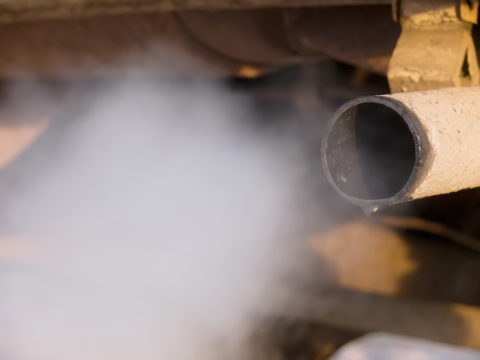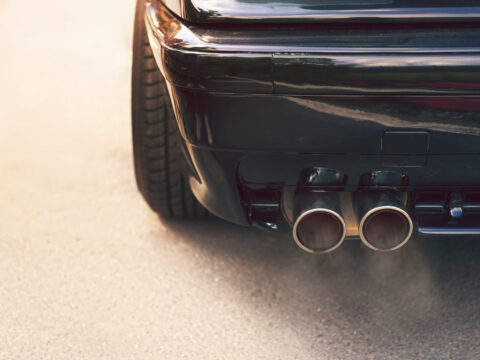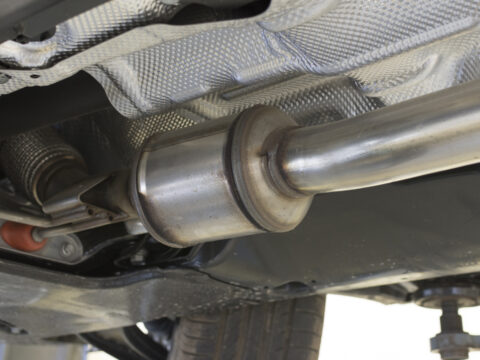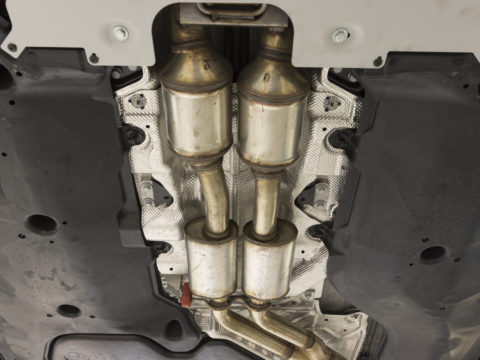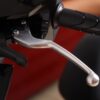The muffler is an integral part of any internal combustion engine. It’s built to last the lifetime of your vehicle.
However, if you drive in a place with harsh road conditions, you might find yourself with muffler problems sooner than you think.
The most common complaint people have with mufflers is a hole in the muffler.
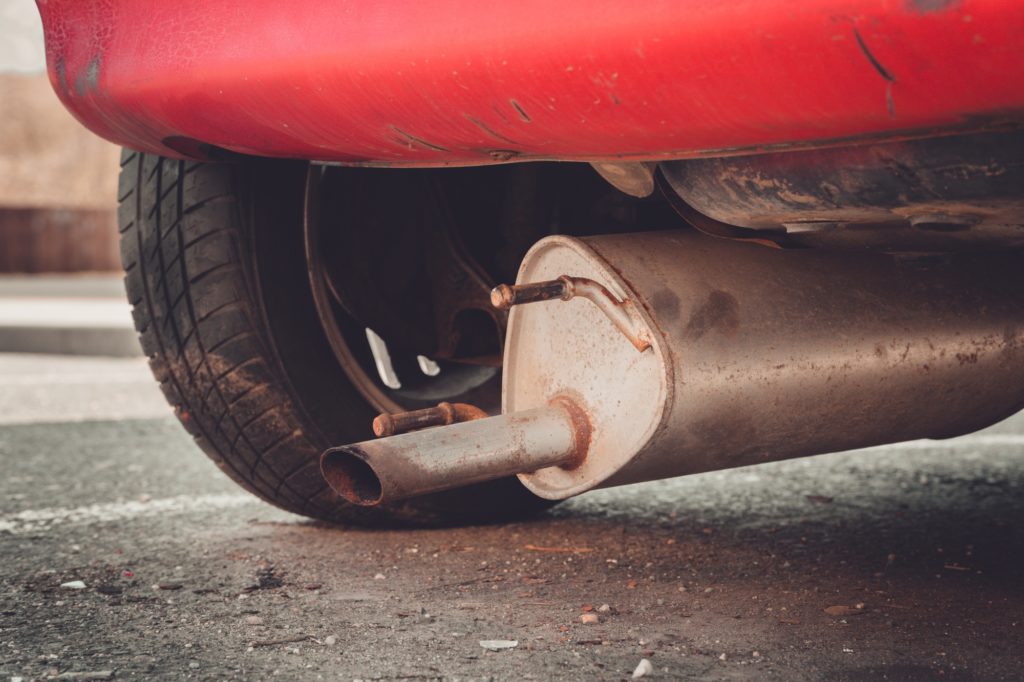
You will know if you have a hole in your muffler by the loud noise, rust holes appearing on the muffler, or because your car fails an emissions test.
A hole in your muffler can lead to excessive noise, exhaust fumes entering your car, and increased pollution.
A hole in your muffler is annoying, but it is not the end of the world. Read on to learn more about the symptoms of a hole in your muffler and how to fix it.
Contents
Is a Hole in Your Muffler Bad?
Having a hole in your muffler will not immediately cause a breakdown. Unlike running out of oil, it will not cause your engine to seize or the car to stop working in a cloud of blue smoke.
You can continue to drive your car with a hole in the muffler.
That said, having a hole in your muffler can be dangerous. Holes in the exhaust system (including the muffler) can cause exhaust fumes to seep into the passenger section of your car.
One of these gasses is carbon monoxide—an odorless, invisible gas that is deadly when inhaled in large quantities.
What Causes Holes in a Muffler?
A hole in your muffler is usually caused by one of two things: road salt and impact.
Road Salt
In many places, roads are salted during the winter to melt snow and ice. In areas that experience frequent snowstorms, road salt is essential to keeping the roads clear and safe.
Unfortunately, road salt can be damaging to cars.
When you drive through wet, salted roads, the salt sprays up and sticks to the underside of your chassis, particularly the muffler. Salt is corrosive.
If metal is exposed to salt for prolonged periods, it starts to corrode and rust.
Impact
Poor road conditions like potholes, speed bumps, debris, and other hazards can put a lot of wear and tear on your vehicle.
Driving at high speeds over bumps and potholes can severely damage the underside of your car and put a hole in your muffler.
Hole in Muffler Symptoms
The good news is that it’s easy to determine if you have a hole in your muffler. It doesn’t take a mechanic to diagnose the symptoms.
Here are five things to look (and listen) for:
Excessive Noise
The number one symptom of a hole in your muffler is the loud noise coming from the exhaust.
A muffler’s job is to reduce exhaust noise, so when it is compromised with a hole, it can no longer do its job.
In bad cases, your engine noise might be so loud that driving is unbearable.
You can also receive a moving violation for driving a noisy car without a muffler.
Fumes in the Cabin
This is a symptom that is more difficult to spot. The carbon monoxide that leaks into your cabin is odorless, tasteless, and invisible.
You will not know right away that fumes are leaking into your car. However, over time these fumes will start to make you sick.
If you start to notice that you always get a headache when you drive, or if you feel dizzy or nauseous inside your car, it might be an indicator that you have a hole in your muffler.
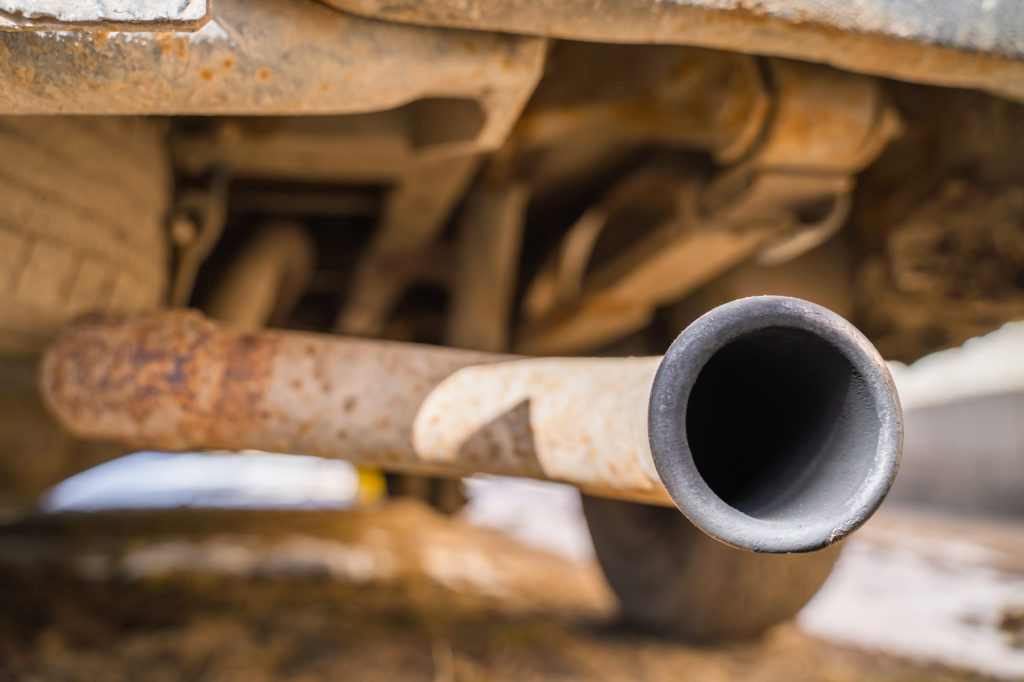
Emissions Test Failure
This is a surefire indicator that your muffler has a hole in it. If the hole is big enough, air from outside the vehicle will be sucked into the exhaust system by the muffler.
An emissions test looks for a particular level of carbon, so if anything (including air) throws off the carbon reading, your car will fail the test.
Engine Misfire
Several things could make your engine misfire, including worn spark plugs and malfunctioning ignition coils.
However, a hole in your muffler or another issue with the exhaust system could also be to blame.
Visible Rust Holes on the Muffler
The easiest way to tell if you have a hole in your muffler is to look at the muffler. All mufflers have small holes in the ends of them (called “weep holes”).
These holes allow excess water to drain out of the exhaust system.
However, road salt can cause rust to eat more holes through the muffler. If your muffler has many holes and the holes are rusty, it is time to take it in for repair.
Can You Repair a Hole in a Muffler?
The short answer is yes, you can repair a muffler hole. The repair usually consists of patching the hole with muffler tape, paste, or welding the area.
In extreme cases, you may need to have your muffler replaced.
Whether you want to attempt the repair yourself or hire a mechanic is another question. It is possible to fix a muffler on your own, especially if you have experience with cars.
There are many products available on the market to patch muffler holes yourself. If you don’t have experience working on cars, we recommend taking it to a mechanic.
How Much Does it Cost To Fix a Hole in Your Muffler?
The good news is, getting your muffler repaired professionally shouldn’t cost you an arm and a leg. Depending on the make and model of your car, you might pay between $75 – $200 for a repair.
This does not include diagnostic testing, taxes, and fees.
If you need to replace the muffler, it can run anywhere between $150 – $300 for standard cars.
If you drive a luxury vehicle or a specialty car, you may need a premium muffler, which can cost more. Installing a new muffler is not time-intensive, so you won’t end up paying a lot for labor.
If you need to replace the full exhaust system, expect to pay more. You may end up paying anywhere between $300 and $2000.
Is it Safe To Drive With a Hole in a Muffler?
While it is not immediately dangerous to drive with a hole in the muffler, driving with a muffler hole long-term can damage your health and the environment, and might damage the rest of your exhaust system.
Repeated exposure to carbon monoxide can lead to carbon monoxide poisoning. Symptoms of carbon monoxide poisoning include nausea, vomiting, chills, and flu-like symptoms.
Furthermore, driving with a damaged muffler causes damage to the environment. Excess fumes leak out of your exhaust system and into the air, increasing air pollution.
This is why cars with damaged mufflers fail emissions tests.
If the muffler hole was caused by a foreign object, it’s possible that the object might still exist in your exhaust system.
If left unchecked, it could cause more damage to the other parts of the system.
If you suspect you may have a hole in your muffler, it’s best to get it checked out right away and not risk driving around with it.

